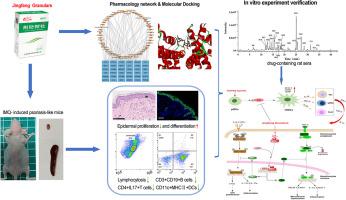Phytomedicine ( IF 6.7 ) Pub Date : 2023-06-08 , DOI: 10.1016/j.phymed.2023.154925 Qingqing Xu 1 , Lisong Sheng 2 , Xia Zhu 3 , Zhaoyang Liu 3 , Guo Wei 3 , Tianyu Zhang 4 , Hang Du 5 , Anbo Yang 6 , Jingchun Yao 7 , Guimin Zhang 7 , Rong Sun 8

|
Background
Jingfang granules (JFG), derived from JingFangBaiDu San (JFBDS), are a traditional herbal formulas used for the treatment of respiratory tract infections. They were initially prescribed to treat skin disease, such as psoriasis in Chinese Taiwan, but are not widely used for psoriasis treatment in mainland China because of the lack of anti-psoriasis mechanism research.
Purposes
The present study was designed to evaluate the anti-psoriasis effect of JFG and reveal the correlated mechanisms of JFG in vivo and in vitro using network pharmacology, UPLC-Q-TOF-MS technology and molecular biotechnology methods.
Results
An imiquimod-induced psoriasis-like murine model was used to verify the anti-psoriasis effect in vivo, with inhibition of lymphocytosis and CD3+CD19+B cell proliferation in the peripheral blood and prevention of the activation of CD4+IL17+T cells and CD11c+ MHC Ⅱ+ dendritic cells (DCs) in the spleen. Network pharmacology analysis demonstrated that the targets of the active components were significantly enriched in pathways involved in cancer, inflammatory bowel disease and rheumatoid arthritis, which were closely related to cell proliferation and immune regulation. The drug-component-target networks and molecular docking analysis demonstrated the active ingredients to be luteolin, naringin and 6′-feruloylnodakenin, which had a good binding affinity to PPARγ, p38a MAPK and TNF-a. Finally, UPLC-Q-TOF-MS analysis to validate the active ingredients in drug-containing serum and in vitro experiments showed that JFG inhibited the maturation and activation of BMDCs via the p38a MAPK signaling pathway and translocation of the agonist PPARγ into the nuclei to reduce the activity of NF-κB/STAT3 inflammatory signaling pathway in keratinocytes.
Conclusions
Our study demonstrated that JFG improved psoriasis by inhibiting the maturation and activation of BMDCs and proliferation and inflammation of keratinocytes, which may facilitate the applications of JFG in anti-psoriasis therapy in clinical settings.































 京公网安备 11010802027423号
京公网安备 11010802027423号